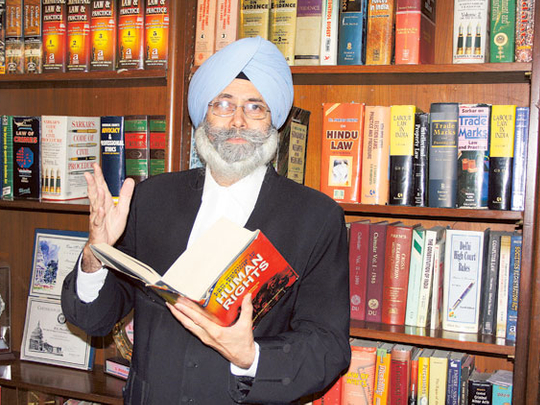
New Delhi: Senior High Court lawyer Harvinder Singh Phoolka is awaiting a judgement on Tuesday when the court will pronounce its order on the fate of Congress leader Sajjan Kumar.
For three decades, Phoolka has been fighting for justice for victims of the 1984 massacre that took place after Prime Minister Indira Gandhi’s assassination on October 31, 1984.
The lawyer was also among those who feared for their lives and drove his then-pregnant wife home through back lanes and alleys to steer clear of the raging mobs in Delhi and survived due to sheer luck.
On November 1, the crowds had, in a programmed manner, torched religious places and homes of Sikhs and burnt them alive. They were allegedly instigated by Congress leaders, including H.K.L. Bhagat, Kumar and Jagdish Tytler. While more than 4,000 Sikhs were reportedly killed all over the country, 2,150 lost their lives in Delhi.
Phoolka represented the victims in court and took up individual cases against Bhagat, Kumar and Tytler.
But despite non-delivery of justice for the victims even after 30 years, he is pursuing one of the longest and torturous legal wars. Meanwhile, many of the traumatised survivors have either died or fled. Some witnesses turned hostile amid pressure from political leaders and gave up the battle.
Phoolka’s first victory came recently when a Delhi court set aside a Central Bureau of Investigation (CBI) closure report giving a clean chit to Tytler in 2009.
It has ordered the CBI to re-investigate Tytler’s role in the massacre of Sikhs in Pul Bangash area.
Phoolka speaks to Gulf News in an exclusive interview.
Gulf News: How hopeful are you that Kumar will be convicted for allegedly inciting a mob to kill Sikhs in the Delhi Cantonment area in 1984?
Phoolka: I am almost certain of his conviction. This is because of the amount of evidence against him and the way the cross-examination was done and the three eyewitnesses withstood the testimony and identified Kumar in court.
But haven’t the powerful always managed to get away without being punished?
That’s an unfortunate thing. And even in this case, some people in the government are trying their best to shield Kumar. The Delhi Police officials have also come to his defence.
What led you to make it your mission to stand by the victims after visiting a relief camp set up after the riots?
I had initiated to visit a relief camp when there was talk in court among lawyers that legal help was needed for the victims. I went to east Delhi’s Farsh Vihar relief camp in November 1984, after three weeks of the mayhem. To my horror, I found that not a single man was present at the camp, which was full of widows aged from 17 to 70. All the victims – orphans, mothers and wives — were from east Delhi’s Trilokpuri area that had suffered the worst in the country. More than 400 Sikhs were killed there and hardly any male member was left alive. The women left behind were illiterate and needed legal help as they had no one to fall back upon.
Tytler has been saying that the probe against him is your personal vendetta. What does he mean by ‘personal’?
I fail to understand what ‘personal’ issue I could have with him. We met the first time in a television studio in 2004. He has accused me of dragging his name in the riots. But the fact is that his name began appearing in the media just days after the riots when I was nowhere in the picture!
He has accused you of blackmailing him. Are you being victimised because of trying to help the victims?
Tytler alone can tell us what blackmailing means. No one has ever gone to him on my behalf. He has accused me of taking money from people to target him. The truth is that I have a flourishing practice relating to property and commercial litigations. I have been doing all cases pertaining to the 1984 riots free of charge. This is perhaps the only reason that I am being termed a human rights activist.
Did you feel dejected when some victims turned hostile?
No, I did not lose my sleep over it. Unlike most human rights activists, I never visited any victim to make them feel comfortable or become overtly friendly with them so that they could confide in me. And once people turned hostile, I never approached them.
The first time a woman witness turned hostile was in the case of Bhagat (now dead). In front of the stress that people go through where powerful people are involved, it can be understood that there is a limit to how much a person can take.
During the last 30 years, what kind of pressures have you faced to end your fight for justice?
Pressure tactics do not work on me. Tytler had threatened that I won’t remain alive. But all these threats are hollow, as he is the one who is seen roaming around with massive security presence around him.











